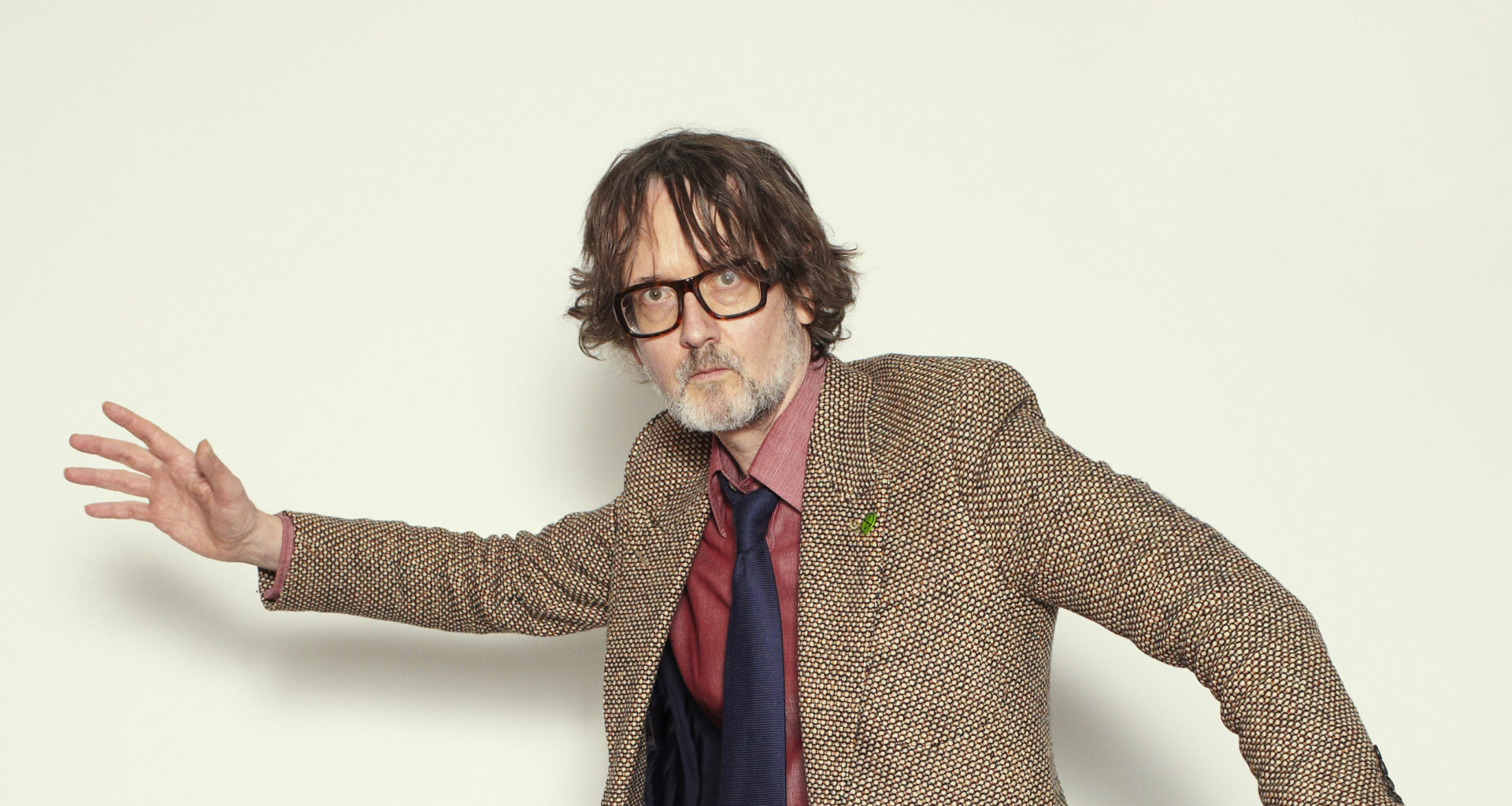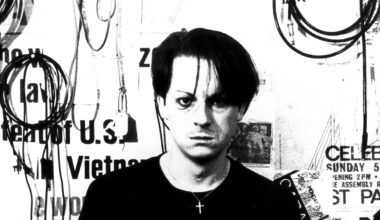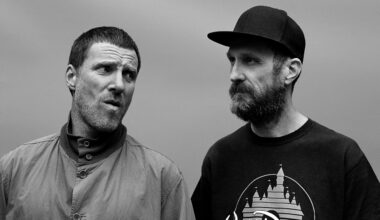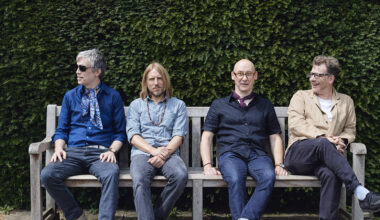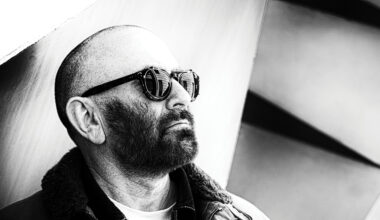He grew up in Sheffield with Cabaret Voltaire and The Human League ringing in his ears. He started out signed to a Warp offshoot label. He made videos for Aphex Twin and Nightmares On Wax. And now, with a brilliant debut album from his new band JARV IS…, the electronic evolution of Jarvis Cocker is complete
Summertime and the living is pretty damn weird. Right about now, Jarvis Cocker and his new band JARV IS… should be playing shows and festivals across Europe to promote their debut album, ‘Beyond The Pale’. But with live music stuck in an indefinite limbo, South Yorkshire’s unlikely answer to Serge Gainsbourg is having to find other outlets for his restless creative urges.
Bunkered down at his house in the Peak District, close to his native Sheffield, Cocker has been forcibly separated from family and friends for weeks, but the 56-year-old former Pulp frontman sounds oddly invigorated by his isolation. He has kept busy making music, writing an eccentric memoir, and assembling DIY videos for JARV IS… on his computer. He has also hosted several weekly ‘Domestic Disco’ nights on Instagram, DJing an eclectic mix where David Bowie, Black Sabbath and Bill Withers rub shoulders with Kraftwerk, Marshall Jefferson, Gary Numan, Aphex Twin, The Human League and more.
“That’s the joy of creation, it can take you out of your immediate surroundings,” he muses, speaking on an old-fashioned phone line. “I’ve been thinking about that a lot during this lockdown. Because I’m lucky in that way, I can try and write a song, or listen to music. I’ve always used music like that. You put on a record that you’re really into and it doesn’t matter where you are, some horrible squat or whatever. For that moment, while you’re listening to that piece, you can escape, you transcend your environment. That’s a really important aspect of art.”
Always a gloriously uncommon pop star, Cocker’s unusual career has exploded into a rich cultural tapestry since he disbanded Pulp in 2002. Besides his two solo records and numerous musical collaborations, he has made a cameo appearance in a Harry Potter film, hosted BBC 6 Music’s ‘Sunday Service’ show and Radio 4’s ‘Wireless Nights’, published a book of lyrics, and worked as an editor-at-large for Faber & Faber. Unlike any of his former Britpop peers, he has matured into something of a much-loved national treasure.
But even though his last solo offering dropped 11 years ago, Cocker has never fully turned his back on stage or studio. Following a hugely successful Pulp reunion tour in 2011-12 and a 2017 collaborative album with piano prankster Chilly Gonzales, he began to experience a nagging sense of unfinished business. Music was beckoning him back home.
“Without wanting to be over-dramatic, I think I realised it was my calling in some way,” he says. “I did ‘Sunday Service’ for seven years, and I’m really lucky that I can do other stuff, but the thing that I always come back to is music. And so eventually, you know, if that feeling keeps returning, you’ve got to take notice of it. I just accept it now, that’s my way of making sense of the world, to try and transform life experiences and things that happen to me into songs.”
Jarvis Cocker’s latest comeback is very much a band project, born from personal and musical chemistry. After discovering harp-playing singer-songwriter Serafina Steer via ‘Sunday Service’, he went on to produce her 2013 album, ‘The Moths Are Real’. When he later invited Steer to join JARV IS…, she recommended her violinist friend Emma Smith. The six-piece line-up also includes Cocker’s long-time Sheffield collaborator Jason Buckle, of The All Seeing I and Relaxed Muscle fame, plus bassist Andrew McKinney (from the James Taylor Quartet) and drummer Adam Betts (from Three Trapped Tigers and Colossal Squid, who has also played with Goldie, Squarepusher and The Heritage Orchestra).
“The fact that it is a band is very important to what’s happened with this record,” explains Cocker. “I had ideas for songs, but it wasn’t until I got the group together at the end of 2017 that it actually started to become something. Having been in a band since the age of 14, you would have thought that would be really obvious.”
‘Beyond The Pale’ contains some classic Jarvis storytelling. It’s deadpan and discursive, brimming with saucy innuendo and sardonic observation. Paying brazen homage to Leonard Cohen, ‘Save The Whale’ was written after Cocker watched Nick Broomfield’s achingly romantic 2019 documentary, ‘Marianne & Leonard: Words Of Love’.
“He’s always been a kind of touchstone for me,” says Cocker. “The very first Pulp record, a mini-album released in 1983 called ‘It’, was just an attempt to recreate the sound of Leonard Cohen’s first LP.”
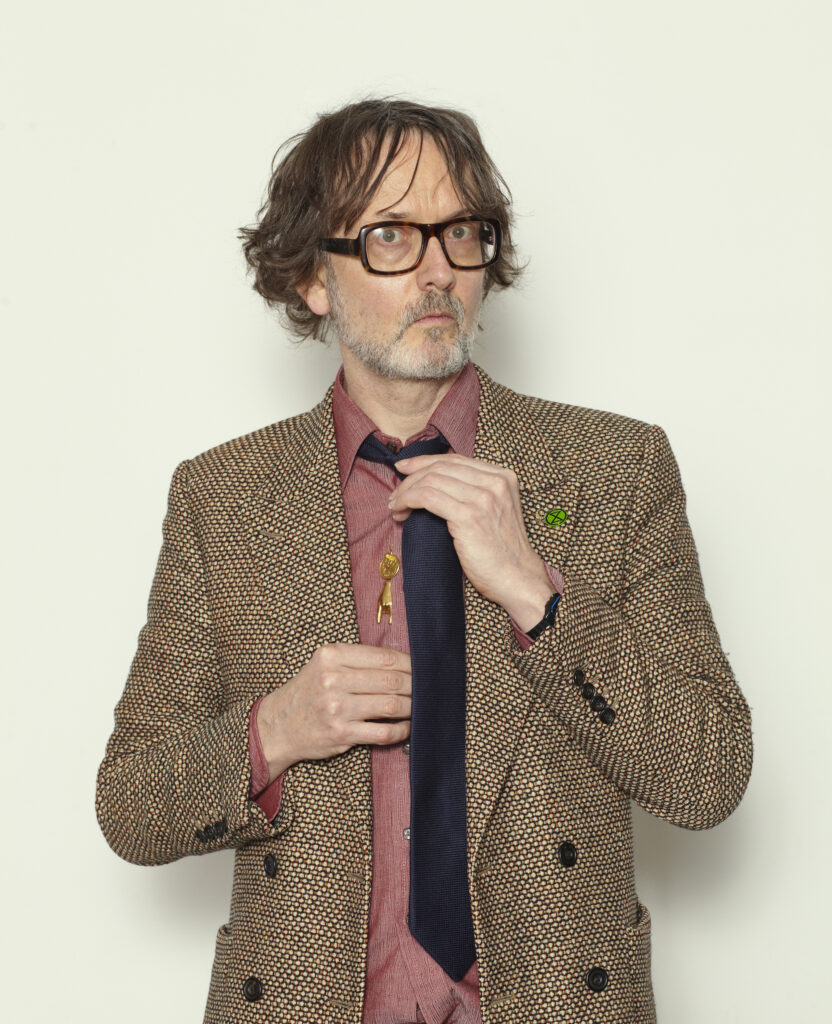
But behind his artfully retro lounge singer style, Cocker has always drawn from a more esoteric and electronic hinterland than most of his indie rock contemporaries. JARV IS… itself began as a kind of conceptual project, with much of the album forged from live recordings. Cocker has also dabbled in the avant-garde classical world and staged performances in art galleries. He credits former pop idol turned abrasive composer Scott Walker and underground electro-punks Suicide as formative inspirations.
“Suicide were a massive influence on me when I saw them at The Leadmill in Sheffield in the early 1990s,” he says. “One of the best performances I’ve ever seen and it was only the two of them. Seeing Alan Vega doing his moves, just the spontaneity of it, was mind-bendingly amazing, because it was all happening in the moment.”
‘Beyond The Pale’ certainly plays to Cocker’s more experimental side, with its verbose lyrical ruminations, burbling synthesiser sonics and sinewy space-rock grooves, as well as a wistful reverence to vintage rave – a perennial obsession for the singer. ‘Must I Evolve?’ is rooted in the same hedonistic Summer of Love adventures as Pulp’s ‘Sorted For E’s And Wizz’ and was inspired by a rave in a tunnel beneath the M25 motorway. ‘House Music All Night Long’, meanwhile, is an accidental lockdown anthem born when Cocker was stuck home alone at a friend’s place while everybody else was out at a techno festival. Composed on an Elka Rhapsody, an antique Italian string synthesiser that reputedly once belonged to Jean-Michel Jarre, this infectious throbber is in tribute to the innocent charm of first generation house tracks.
“I really liked those early house records because they were often going for that big, anthemic, almost symphonic sound,” he enthuses, “but played on really early and quite bad keyboards. So you’d have a shitty string sound and this keyboard’s kind of got that. It’s a naive sound, which I’ve always liked. That’s why early electronic instruments are interesting to me. They always aim big, but don’t quite get there. There’s something very charming about it. Something human.”
It is no accident that much of Cocker’s post-Pulp musical explorations have been in the electronic realm – writing, producing and collaborating with Air, Marc Almond, Discodeine and others. Let’s all meet up at the Disco 2020.
“I think there’s some life left there,” says Cocker. “Whereas rock, I feel, has been overdone and there are not that many new avenues to explore. Most of the people I know in bands now are making music that is part of the electronic world. I’ve been DJing a bit with Alexis from Hot Chip and I know the guys from Soulwax, David and Stephen. I think that’s where there’s still a bit of freedom, still places to explore.”
Cocker’s electronic evolution may have been a gradual process, but machine music was always in his DNA. He grew up in 1970s Sheffield, the northern powerhouse famed for its concrete modernism, municipal socialism and world-changing synth bands. Cocker used to baulk at the lazy cultural branding of Sheffield as “Steel City”, but he later came to agree with The Human League and Heaven 17 co-founder Martyn Ware, who claims the city’s groundbreaking music scene was shaped by the booming noise of the drop forges. Industrial sounds rooted in heavy industry.
“When there were still steelworks open in Sheffield, you heard sub-bass on a daily basis because of the sound of those steam hammers,” says Cocker. “The two predominant genres around at that time were the synth stuff and a massive heavy metal scene, which is again that volume thing. So, yeah, that interest in the extremes of sound is maybe a common thread to Sheffield.”
According to Philip Oakey, glam rock also struck a deep chord with the dole queue dandies and floppy disc futurists of Sheffield, a unifying thread that links The Human League, Def Leppard, ABC and Pulp.
“Phil’s got a point there,” says Cocker. “That’s another thing I remember from being a kid, seeing people wearing full-on glam outfits queueing at a bus stop, or just walking through the city centre. It felt like an alien had landed. In that kind of industrial and very dark environment, then you suddenly see this silver thing walking down the street. It was such an amazing, eye-catching image.”
Cocker believes Sheffield’s strikingly modern architecture also helped shape the city’s emphatically futurist sound, from the towering “streets in the sky” brutalism of the iconic Park Hill estate to the space-age “hole in the road” of Castle Square, a giant flying saucer nestled beneath a traffic roundabout.
“Sheffield really had a go at reinventing itself after the war,” he says. “I think it led into Cabaret Voltaire and The Human League, music that was very much about the sci-fi elements of looking at the future, rather than back into the past.”
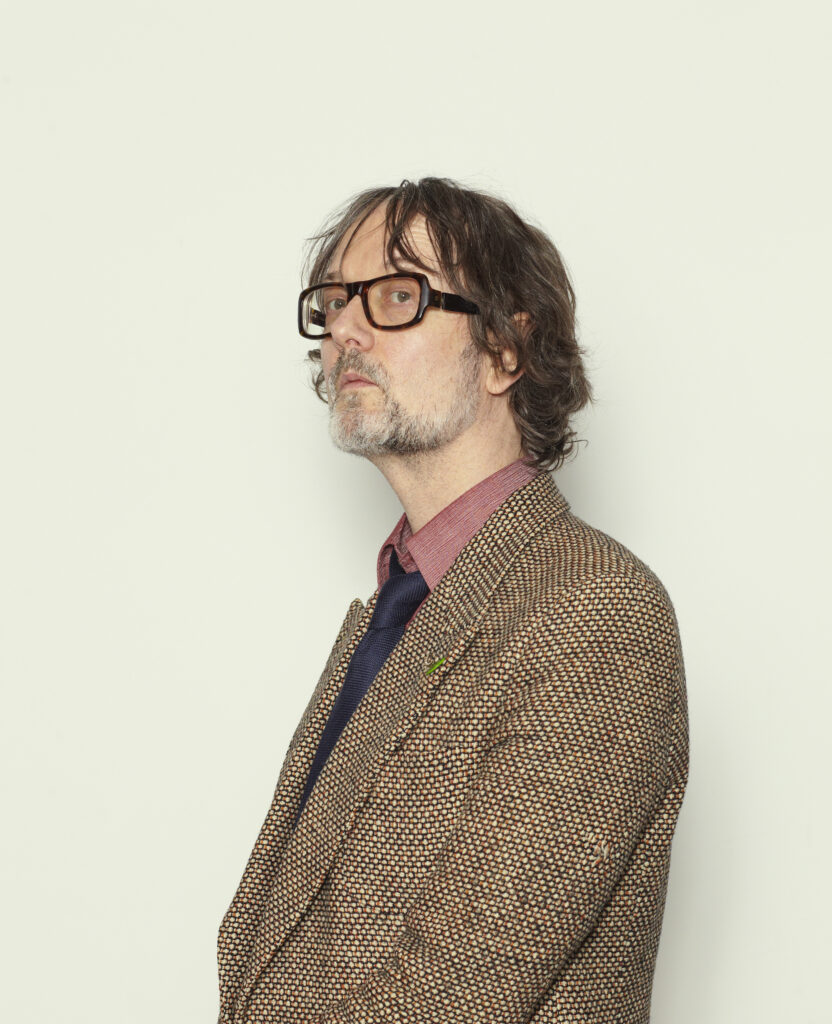
As a teenager in late 1970s Sheffield, Cocker would mingle with local post-punk acts, including Clock DVA, Artery, Vice Versa, In The Nursery, They Must Be Russians and more, often in the sticky-floored basement setting of the city’s main alternative venue, The Limit, home to early shows by Depeche Mode, U2 and Pulp themselves. He remembers seeing Cabaret Voltaire and The Human League gig posters dotted around town and attending an early Cabs show at Sheffield Art College on Psalter Lane. But in person, the underground electronic stars already seemed like dauntingly unapproachable elder statesmen as they huddled around their regular table in The Beehive pub on West Street.
“It’s weird now because they were probably only three or four years older, but it was enough at that time,” he recalls. “Even with the pubs, it’s pathetic really, but we went to The Hallamshire Hotel on the same road, same side of the street, approximately 40 yards from The Beehive. I suppose the younger generation went there. There was a room above The Hallamshire where they used to put bands on and that’s where we played a lot of our earliest shows. Sometimes we used to walk up to The Beehive to have a drink and we’d see the Cabs and everybody over in their corner, but they just seemed too old and cool and sophisticated.”
The embryonic Pulp adopted a much more traditional jumble-sale indie-rock aesthetic than their electronic peers, of course. Even so, Sheffield’s signature synthpop sound seeped into Pulp’s output almost by default.
“There must have been an influence,” says Cocker. “When we went down to London for our first John Peel session, which was 1981, I’d got to know this electronic group called The Naughtiest Girl Was A Monitor, and we borrowed some synthesisers from them. It seemed like you couldn’t be a Sheffield band without synthesisers, but we couldn’t afford one. Then we got the money from John Peel, which I think was about £500, an absolute fortune at the time, so then we bought our first synth, a Moog Prodigy, and we were very proud of that.”
While Pulp struggled towards a career breakthrough for most of the 1980s, Cocker began making connections on Sheffield’s burgeoning electro scene. He moved into a shared flat in the same building as FON, the studio that industrial funk group Chakk were smart enough to build in 1985 with their major label advance. Chakk never achieved the commercial success predicted for them, but they bequeathed the city a state-of-the-art 24-track recording suite, complete with its own record shop and label.
In 1987, Pulp recorded at FON and almost signed to the label, but the deal fell apart. Two FON shop employees, Steve Beckett and Rob Mitchell, who later founded Warp Records with FON’s in-house producer Rob Gordon, played in a band called Lay Of The Land with sometime Pulp member Steven Havenhand.
“The quietest bass player known to mankind,” quips Cocker. “So he didn’t last that long.”
Cocker left Sheffield in September 1988 to study film at St Martin’s College in London. It was here that he met the Greek woman who would later inspire Pulp’s most celebrated hit single, ‘Common People’. The art school life also offered other key sources of stimulus, including a vintage EMS Synthi housed in the bowels of the college. Cocker used the machine to add sound effects to his graduation film.
“The rumour was that Brian Eno had played it, because he had links with the St Martin’s film department,” says Cocker. “Nobody really used it, though. The keyboard didn’t work properly and it was in this room on its own. Obviously, I kind of got excited by it. I strongly considered nicking it when I left college.”
Cocker’s art school years in London coincided with the acid house boom and he began attending raves with Pulp’s new bass guitarist, fellow Sheffield exile Steve Mackey. When they returned to Yorkshire to work on Pulp’s ‘Separations’ album, the pair began to push for a more electronic sound.
“Myself and Steve, we were the two who’d been out raving, and we sort of felt we had to embrace this,” says Cocker. “So poor old Nick, our drummer, had to learn how to programme an 808. We took the songs that had been written and replaced all the drums with the 808 and sequencers. The last song on ‘Separations’ is called ‘This House Is Condemned’ and that’s the nearest we ever got. It’s not a proper house track, but it was interesting because it was us really trying to utilise that technology and make something a bit different.”
Get the print magazine bundled with limited edition, exclusive vinyl releases


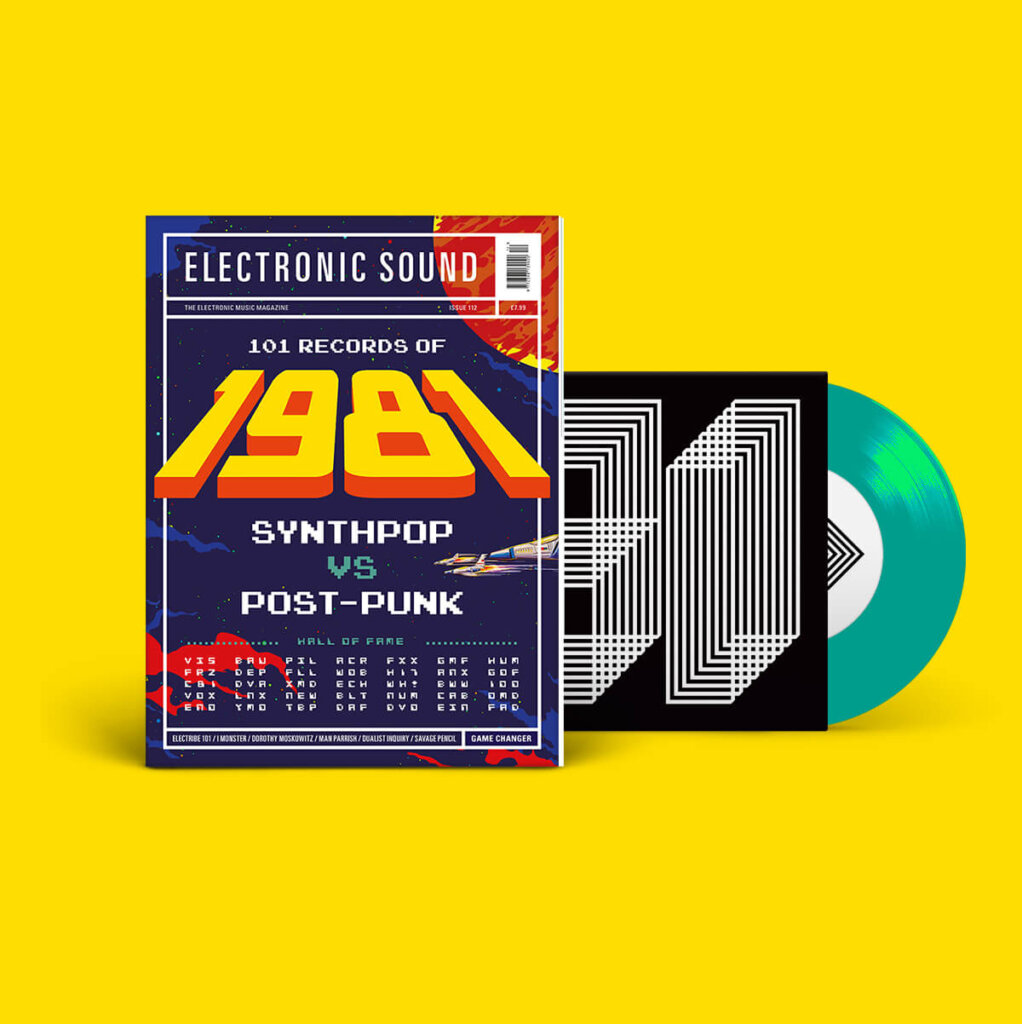
After Cocker completed his St Martin’s course, Pulp briefly signed to the short-lived Warp offshoot label Gift. The singer also co-directed a handful of music videos for Warp, including ‘On’ for Aphex Twin and ‘Aftermath’ for Nightmares On Wax.
“I knew Steve and Rob,” he explains. “They knew I’d gone down to film college, so they could get me to make videos relatively cheaply.”
In the mid-1990s, of course, Cocker finally blossomed from an arch art school parody of a pop star into the real thing. Bringing a heady mix of self-irony, subversive geek-chic and spiky political commentary to the cartoonish Britpop party, he scored an alternative national anthem with ‘Common People’ in 1995, earned global notoriety when he drunkenly invaded Michael Jackson’s queasy BRITs performance in 1996, and basked for a few years in tabloid-sized fame.
But even throughout Pulp’s imperial phase, Cocker kept at least one finger on Sheffield’s electronic pulse. In 1999, he collaborated with South Yorkshire supergroup The All Seeing I on their ‘Pickled Eggs And Sherbet’ album, penning wry lyrics for Philip Oakey and old school crooner Tony Christie. Scoring big hits with ‘Beat Goes On’ and ‘Walk Like A Panther’, the group’s core trio was Jason Buckle, Dean Honer from I Monster, and Richard “Parrot” Barrett, all stalwarts of the city’s electro scene.
“Parrot is a legendary figure in Sheffield,” says Cocker. “Along with Winston, they were the first people to play house music in the city. And he did that amazing record with Richard H Kirk, ‘Testone’ by Sweet Exorcist, which was one of the first Warp releases.”
After Pulp went on indefinite hiatus in 2002, Jason Buckle became Cocker’s regular collaborator. Now a member of JARV IS…, Buckle is a living link to the singer’s Sheffield electro roots. But their first joint project was the bizarre electro-trash duo Relaxed Muscle, for which Cocker donned a Mighty Boosh-style skeleton suit disguise and tried to pass himself off as sleazy Doncaster nightclub entertainer Darren Spooner, a character he first played in Pulp’s ‘Mis-Shapes’ video. With hindsight, he views this Jekyll-and-Hyde transformation as a final cathartic exorcism before he relocated to Paris to embrace married life and parenthood with French stylist Camille Bidault-Waddington.
“It was a bit of a relief to pretend to be somebody else,” he notes. “I had a studio in the basement of my house in London and Jason was living quite near me. He played me a few little things and I guess it just appealed to me to do something really quick and cheap. I think the Relaxed Muscle album cost about £4.50. That was the first stuff we worked on and we’ve always messed around together since then.”
Nowadays, of course, Cocker is feted in his home city as a music legend. In 2015, he attended the unveiling of a plaque at The Leadmill venue commemorating Pulp’s first show there in August 1980. He’s also recently finally crossed paths properly with Stephen Mallinder and Richard H Kirk of Cabaret Voltaire. Sheffield’s electronic founding fathers, who had seemed so fearsomely cool in the Beehive pub on West Street 40 years ago, turned out to be pussycats.
“Mal is one of the most affable people I’ve ever met,” laughs Cocker. “He’s really funny. And Richard Kirk’s like that as well. I’ve only met him a few times, just in the last five or six years, but he’s very approachable and funny. It’s a weird thing, I guess we were scared of them when we were young. They seemed too, I don’t know, too grown up.”
Whatever his fogeyish, self-consciously analogue public persona may suggest, Jarvis Cocker does not actually live in 1974. But he has spent much of lockdown musing on his past as he sifts through decades of accumulated junk for a forthcoming left-field memoir, ‘This Book Is A Song’, [on publication the title was changed to ‘Good Pop, Bad Pop’- Ed] a work of “self-excavation” prompted by random souvenirs from his personal archive.
One such sacred relic is a ticket to the John Peel Roadshow at Sheffield Polytechnic in October 1981, the night he handed a Pulp demo tape to the much-loved Radio 1 DJ. A few days later, Peel’s producer booked the band for a session, spurring Cocker to postpone his college plans and embark on the long march to pop stardom.
“I was only 17 at the time, so that completely changed the course of my whole life,” he says.
These days, Cocker rarely listens to his old Pulp songs, pointedly excluding any of their big Britpop anthems from all JARV IS… live shows to date. The last time he revisited these tracks was for Pulp’s reunion tour nine years ago, a triumphant lap of honour that the singer says will almost certainly be their last. But at least this rapturously received tour reassured him that he had made the right decision as a geeky teenager.
“To go back and listen to those songs was like, ‘Alright, I didn’t waste my youth then’,” he says. “We got something out of it. That was a nice feeling. At the start, it was probably just to get girls. Due to being an awkward teenager, I bought into the rock star fantasy thing.”
As he cruises through middle age, it’s interesting that Cocker is now looking to the likes of Leonard Cohen, Scott Walker and Alan Vega as role models. All of them vital and creative to the last breath, none of them settling for a comfortable compromise. Music as spiritual nourishment, as liberating force, as lifelong companion.
“We touched on it earlier,” he says. “The realisation that this is what I’m meant to do, my way of expressing myself. I think that is a fairly pure motivation. So I intend to keep doing it for as long as it is humanly possible. The impulse remains the same, to try and make sense or to give a narrative to your life. I think it’s still valid, hopefully.”
‘Beyond The Pale’ is released by Rough Trade
